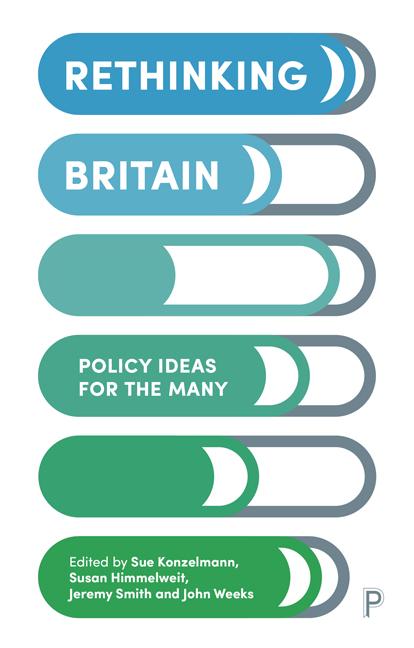Book contents
- Frontmatter
- Contents
- List of Tables and Figures
- The Contributors
- Foreword
- Introduction
- Interlude: ‘Mirror, Mirror, On the Wall – Who has the Highest Debt of All?’
- Part One Building a Full-Employment Economy: Introduction
- Part Two Public Investment – Prioritising Society Rather than Profit: Introduction
- Part Three Making Finance Work for Society: Introduction
- Part Four Genuine Social Security: Introduction
- Part Five How to provide for Social Needs: Introduction
- Conclusion
- Jargon Busters
- References and Further Reading
- Index
Interlude: Safe as (Council) Houses...
Published online by Cambridge University Press: 11 March 2021
- Frontmatter
- Contents
- List of Tables and Figures
- The Contributors
- Foreword
- Introduction
- Interlude: ‘Mirror, Mirror, On the Wall – Who has the Highest Debt of All?’
- Part One Building a Full-Employment Economy: Introduction
- Part Two Public Investment – Prioritising Society Rather than Profit: Introduction
- Part Three Making Finance Work for Society: Introduction
- Part Four Genuine Social Security: Introduction
- Part Five How to provide for Social Needs: Introduction
- Conclusion
- Jargon Busters
- References and Further Reading
- Index
Summary
There has been much talk in the media about the lack of housing in the UK. But many of us don't have to watch TV to know that there's a problem – we’re living the nightmare. ‘Generation Rent’ is not only experiencing a shortage of housing; there's also low wages, high rents and a fair bit of badly maintained and/or low-quality accommodation to contend with.
But simply building more ‘affordable’ housing for sale won't solve the problem. As soon as a house enters the market, its price will inevitably rise well beyond ‘affordable’ levels. If a local authority in London wants to buy back an ex-council home, for example, it will face an asking price around six times what the house was originally sold for.
There's nothing inherently wrong with renting a home – after all, most of Europe still does. There are, however, significant problems in Britain's private rental market – high rents, poor maintenance and low-quality homes being among the most common complaints. However, rather than supporting more public sector housing, various attempts to control rents and improve standards have been tried, but the problems continue.
Back in the day, local authority or ‘council’ housing was a very different proposition to many current privately rented homes. Not only were they built solidly in the first place (bizarrely, affordable housing has its own – and stronger – set of building regs); they were also properly maintained, and local government was in full control of the rents.
Council homes, however, were among the very first victims of privatisation, with Margaret Thatcher's ‘Right to Buy’ scheme reducing their numbers from 6.5 million in 1980 to around 2 million in 2019 – while making it difficult for more to be built. A recent article in The Observer, however, based on data obtained under the Freedom of Information Act, shows that the mass sell-off has not exactly resulted in the promised ‘property-owning democracy’. Instead, over 40 per cent of the council homes sold off in London are now in the hands of private landlords – with some owning up to six homes. Worse still, local authorities are now forced to spend tens of millions to fund rents that are higher than their own – on homes they used to own outright.
- Type
- Chapter
- Information
- Rethinking BritainPolicy Ideas for the Many, pp. 136 - 137Publisher: Bristol University PressPrint publication year: 2019

